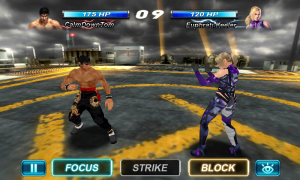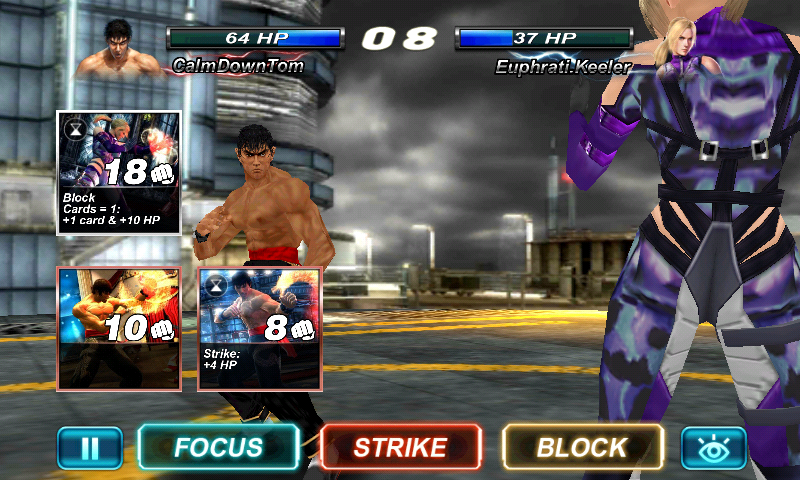Tekken Card Tournament is a free to play collectible card game for PC, iOS and Android, that is also available as physical cards.
Is there a big cross over between collectible card game fans and fighting game fans? I’m not sure, but there are certainly some parallels between the two. The ruthless competition. The complex rule sets. The difference in ability between new players and veterans. Both types of games have committed, dedicated fanbases, and the two genres are blended quite cleverly in Tekken Card Tournament.
It’s a deceptively simple little game at first glance. You choose a character then go online (in tournaments or quick matches) to fight human opponents, or play against the AI. At first only easy AI opponents are available, and at this level the game AI will put up a challenge, but won’t wipe you off the face of existence in a single turn like human players can.
 It’s a turn based affair, and each round you have ten seconds to choose what you want to do. You can focus, strike or block. If you focus then you draw a card. You can have up to five cards in play at once. If you choose to strike then you use all cards that you have in play against your enemy. Each card is effectively an attack of some sort. So if you have five cards in play and you choose strike, you will perform five attacks on your opponent. You get to see the whole thing take place in a simplified version of the Tekken fighting engine, so you don’t have to imagine Heihachi punch that stupid Panda in the face, you get to see it in all its loveliness. The cards each have different values and different associated moves from the Tekken series, so if you are playing as Law, you might have a card that makes you perform a punch, a flip kick, a knee strike or some other way to hurt your enemy. Your third option is to block. This will allow you to ignore the first two strike cards of your enemy, so if you block and your enemy only has two strike cards, you will take no damage, whereas if they have five you will still take three cards of damage. Thats still far less than if you were hit with a whole five card combo though.
It’s a turn based affair, and each round you have ten seconds to choose what you want to do. You can focus, strike or block. If you focus then you draw a card. You can have up to five cards in play at once. If you choose to strike then you use all cards that you have in play against your enemy. Each card is effectively an attack of some sort. So if you have five cards in play and you choose strike, you will perform five attacks on your opponent. You get to see the whole thing take place in a simplified version of the Tekken fighting engine, so you don’t have to imagine Heihachi punch that stupid Panda in the face, you get to see it in all its loveliness. The cards each have different values and different associated moves from the Tekken series, so if you are playing as Law, you might have a card that makes you perform a punch, a flip kick, a knee strike or some other way to hurt your enemy. Your third option is to block. This will allow you to ignore the first two strike cards of your enemy, so if you block and your enemy only has two strike cards, you will take no damage, whereas if they have five you will still take three cards of damage. Thats still far less than if you were hit with a whole five card combo though.
So each round becomes a bit of a rock-paper-scissors affair. If players are of a similar level then it really is all about predicting your opponents moves. For example, early on my strategy was always to strike early, after only a single focus, just to put my opponent on the back foot and gain a little life lead. From there I would constantly poke at them, forcing them to block, only to set them up for a big combo.
 Of course if this was all there was to the game it would be far too simple. The complexity of the game comes from the cards you have in your deck. You collect these cards as you play, either through earning in game currency or real money or by scanning in physical cards which you can also buy with real money. Cards vary significantly in value, with some doing a measly five points of damage while others might do as much as fifty points. Furthermore, each of these cards can have a special effect. For example they might regenerate your health if you hit an enemy or cause your opponent to discard some cards. Suffice it to say a strong deck will absolutely massacre a weak one.
Of course if this was all there was to the game it would be far too simple. The complexity of the game comes from the cards you have in your deck. You collect these cards as you play, either through earning in game currency or real money or by scanning in physical cards which you can also buy with real money. Cards vary significantly in value, with some doing a measly five points of damage while others might do as much as fifty points. Furthermore, each of these cards can have a special effect. For example they might regenerate your health if you hit an enemy or cause your opponent to discard some cards. Suffice it to say a strong deck will absolutely massacre a weak one.
Each player can also have one “power card”. This is played automatically at the start of the game, and confers extra special effects or improved hit points for your character. Even more so than your deck, these cards can determine the winner of a game. Early on when I had no power cards, I would find every enemy I faced had 120 hit points while I started with a measly 90. This felt pretty cheap, as the life lead of my opponents meant that all the level 3 Yomi in the world wasn’t going to help me win. Later, when I found a 175 hit point card for my main (Law, Wa-chaa!), I felt like my victories were cheap. How could my opponents have a chance when their hit points were half as high as mine? I could just focus five cards then attack, and even if they blocked the first two strikes I could still simply steamroller them over the course of a whole game.
 These issues are mitigated when you play against players of the same level with decks of similar strength. That’s not always possible though. It’s a shame, because I really enjoy the mind games involved, but when you spend a lot of time constructing a powerful deck they become secondary. Who needs to psyche out your opponent when your cards are determining your actions. The battle is won or lost before a turn is played.
These issues are mitigated when you play against players of the same level with decks of similar strength. That’s not always possible though. It’s a shame, because I really enjoy the mind games involved, but when you spend a lot of time constructing a powerful deck they become secondary. Who needs to psyche out your opponent when your cards are determining your actions. The battle is won or lost before a turn is played.
I also never manged to get the physical card ARG function working, and even though its a bit of a gimmick I still wanted to see my character standing on his card through my phone.
The bigges issue here is that Tekken Card Tournament is the very definition of a “pay to win” game. Quite simply, if you spend more money on the game you will win more. Better decks, better power cards and more flexibility in your deck (such as “card fusion”, an expensive process that lets you make new cards by combining old ones) results from more financial outlay.
 And this has always been the case with collectible card games. To that extent you could defend the criticisms against Tekken Card Tournament by saying it’s no different to something like Magic: The Gathering. You can get most of the cards by playing rather than paying, but no matter how many hours your grind in Tekken Card Tournament you will always be at a disadvantage against someone who has laid down their cash.
And this has always been the case with collectible card games. To that extent you could defend the criticisms against Tekken Card Tournament by saying it’s no different to something like Magic: The Gathering. You can get most of the cards by playing rather than paying, but no matter how many hours your grind in Tekken Card Tournament you will always be at a disadvantage against someone who has laid down their cash.
Despite all those issues, there’s something really appealing about this strange blend of fighting game and CCG. I mean, it’s free to play and fun, even when you’re losing. It’s a bit like a turn-based fighting game, which I love the idea of, and there’s a great deal of joy in seeing the 3D modeled Tekken characters batter each other based on the cards you play. The card art is also good, and the game can feel generous when its rewarding you with coins for logging in each day, for gaining specific numbers of victories or matches or for playing well.
So yes, there’s a lot that people won’t like about Tekken Card Tournament. That being said, I don’t need to play it anymore now that I have written about it. But I will. And I’ll still jump up and down when I beat another player online with my modest Law deck. Waa-chaaa!
